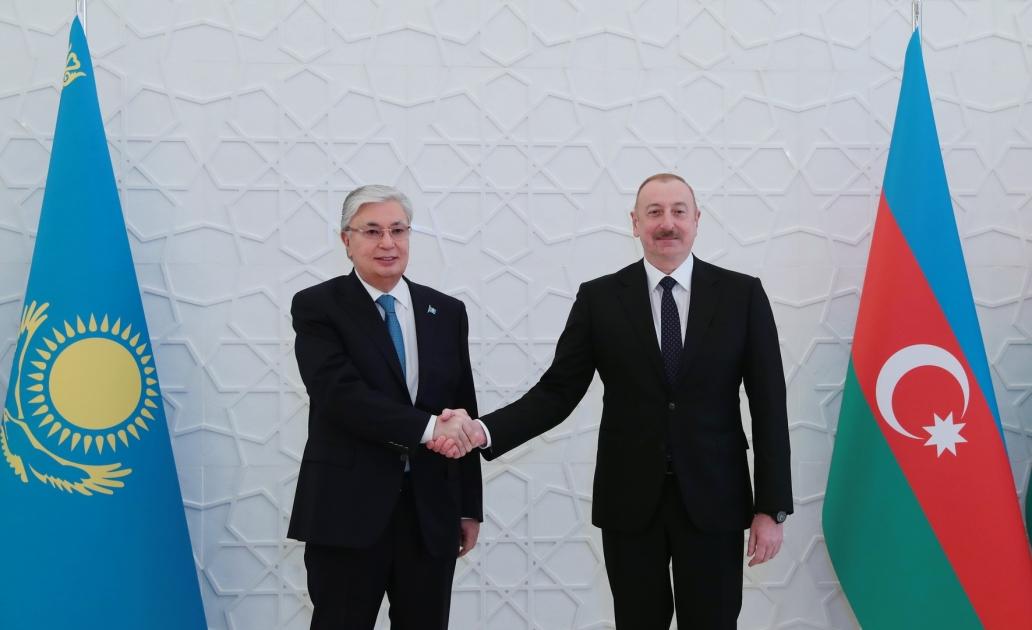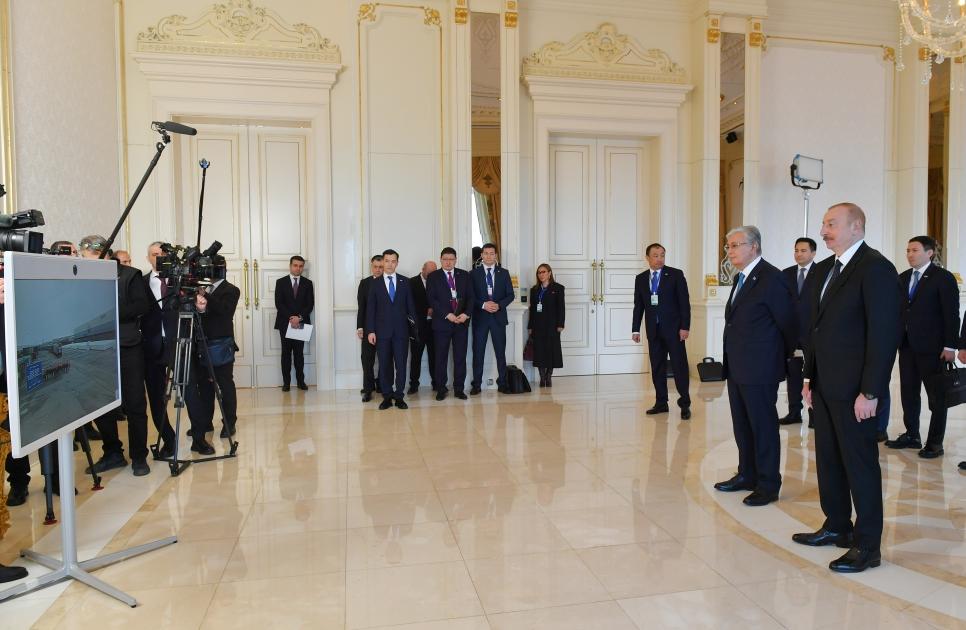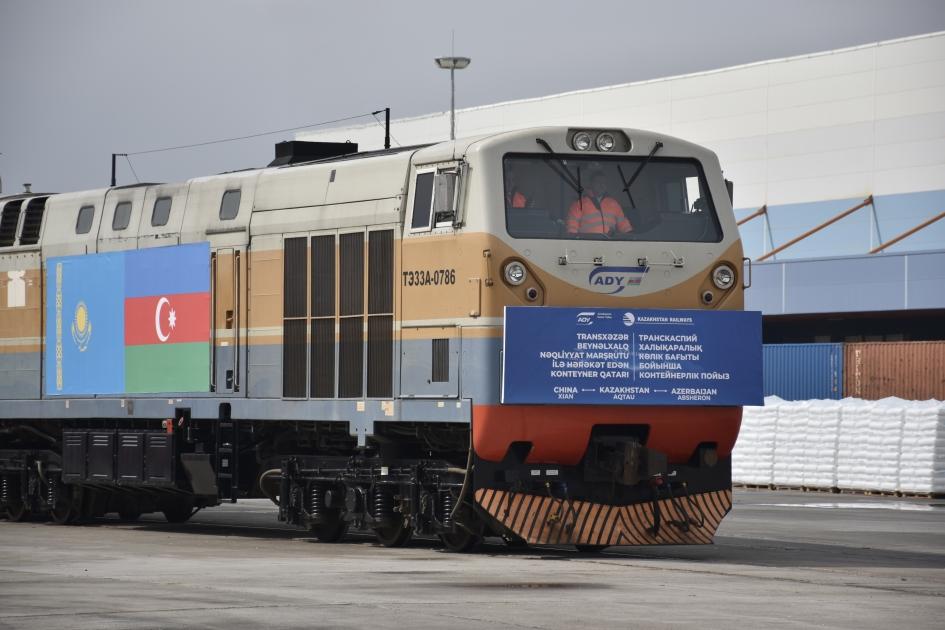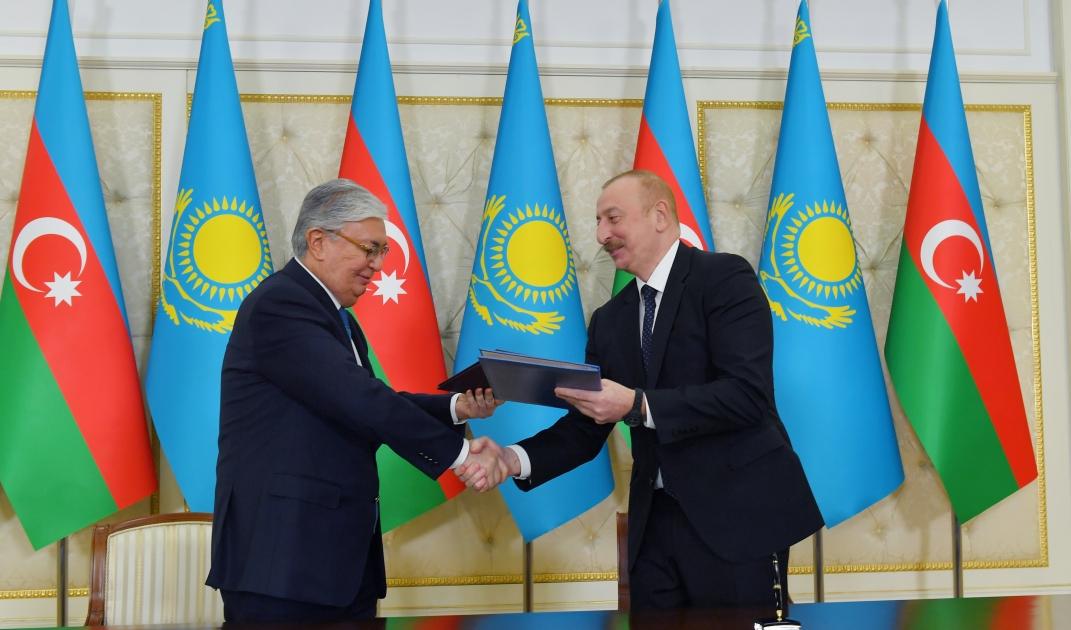Azerbaijan, Kazakhstan mark further milestone in integration strategy Shared understanding of priorities
Less than a week ago, the Intergovernmental Committee on Trade and Economic Cooperation between Azerbaijan and Kazakhstan met in Astana. On the heels of the meeting, Baku hosted the Azerbaijan-Kazakhstan Business Council, convened to define the directions and priority goals for the development of bilateral business relations. The meeting included the signing of an agreement between business associations, measures to expand the Business Council and plans to increase freight traffic along the Middle Corridor. SOCAR and KazMunaiGas also discussed proposals to expand oil transit via the Baku-Supsa route and to implement joint projects in the green energy and geological exploration sectors.
It should be noted that the second meeting of the Azerbaijan-Kazakhstan Business Council was held on the occasion of the state visit of Kazakh President Kassym-Jomart Tokayev to Azerbaijan. The first meeting of the Supreme Interstate Council of Azerbaijan and Kazakhstan, attended by the leaders of the two countries, was held in Baku to coincide with the visit.

"Kazakhstan and Azerbaijan are two brotherly states, our peoples have lived in peace, brotherhood and cooperation for many centuries, and as two independent states we have been actively cooperating both in international structures and in bilateral formats for more than 30 years. Recently, however, the dynamics of our mutual visits have been very illustrative, showing that relations have gained new momentum. Our agenda today includes many topics such as transport and logistics, energy, digitalisation, and humanitarian issues," said President Ilham Aliyev at the meeting of the Supreme Interstate Council. The head of state thanked the president of Kazakhstan for his brotherly assistance in the reconstruction of Karabakh and the construction of the Kurmangazy Children's Art Centre in Fuzuli.
"This is the first time we are holding a meeting of the Supreme Interstate Council and we have discussed in detail literally all issues related to our trade, economic and investment cooperation. Prospects are very good, with the understanding that the governments, of course, will be engaged in the implementation of agreements that will be reached today in the form of signed documents, agreements" President of Kazakhstan Kassym-Jomart Tokayev said.
The leaders took part in the signing ceremony of the resolution of the 1st session of the Supreme Interstate Council, as well as several other Azerbaijani-Kazakh documents. The most important of them concern the economic sphere, including the Memorandum of Understanding between the Small and Medium Business Development Agency of Azerbaijan (KOBİA) and Kazakhstan's Damu Entrepreneurship Development Fund Joint Stock Company, the Memorandum of Understanding on the Exploration and Use of Outer Space for Peaceful Purposes between the Ministry of Digital Development and Transport of Azerbaijan and the Ministry of Digital Development, Innovation and Aerospace Industry of Kazakhstan, as well as the Strategic Partnership Agreement between Azerbaijan and Kazakhstan.
The Memorandum on Strategic Cooperation between the State Oil Company of Azerbaijan (SOCAR) and KazMunayGas National Company JSC on the purchase and sale of Kazakh oil and the Agreement between SOCAR and KazMunayGas on the gradual increase of the volume of Kazakh oil transit through the territory of Azerbaijan, signed in Baku, are of paramount importance for the development of trade and transport relations between the two countries.
On the same day, the presidents of Azerbaijan and Kazakhstan watched via video link the arrival of the train carrying 61 containers from the Chinese terminal in Xi'an. The containers were reloaded in Kazakhstan's port on the Caspian Sea and transported to the port of Alyat and from there to Baku's Absheron railway station, after travelling 7,000 kilometres in just 11 days as part of a multimodal transport.

"We've taken part in the symbolic greeting of the container train that was on its way from China through Kazakhstan to Azerbaijan. This is another symbol of the fact that the Trans-Caspian Transport Corridor is already a reality, which in turn will largely determine the level of regional cooperation, and in this direction, Baku and Astana are demonstrating their commitment to regional cooperation and strengthening their relations with neighbours," said President Ilham Aliyev, paying special attention to the development of the transit corridor. The head of state emphasised that the current geopolitical situation, which has essentially brought the Trans-Caspian transport route to the forefront of the world transport and logistics spectrum, is based on a solid foundation, as in recent years Kazakhstan and Azerbaijan have made huge investments in railways, airports, highways and sea ports, as a result of which the transport infrastructure of our countries now fully meets international standards.
"Today, the transport and logistics framework of the Eurasian continent is being created. Today's event is an important milestone in the history of interaction and cooperation between Kazakhstan and Azerbaijan in this field," President Kassym-Jomart Tokayev stressed.
Indeed, transport and raw materials have been the mainstay of economic cooperation between Baku and Astana since independence. In recent years, however, the Caspian neighbours have aimed to multiply trade and diversify business relations through non-oil joint ventures. The opportunities in these areas were the subject of in-depth discussions at the fifth meeting of the Intergovernmental Conference in the Kazakh capital in March.
"I would like to remind you that the results of the next meeting of the intergovernmental commission were very fruitful: many agreements were reached, including the establishment of the Azerbaijan-Kazakh Investment Fund, the increase of cargo traffic through the Trans-Caspian International Transport Route (TITR), the expansion of cooperation in the sphere of light industry, chemical industry, machine-building, the increase of trade, etc.," said Azerbaijani Ambassador to Kazakhstan Agalar Atamoglanov, who took part in the II meeting of the Azerbaijan-Kazakhstan Business Council in Baku the previous day.
The head of the diplomatic mission noted that the expansion of cooperation in the sphere of transport and logistics is one of the most important priorities: "The potential of TMTM is attracting the attention of investors not only in the region but also far beyond its borders".
This is not surprising if we take into account the indicators of transport via TITR given by the Deputy Minister of Transport of Kazakhstan Satzhan Ablaliyev: "In 2023, transport via the Trans-Caspian route will increase by another 840 thousand tonnes - up to 2.7 million tonnes. In January 2024, transportation via TITR increased 2.5 times and reached 374 thousand tonnes. There is also a significant growth in the transportations of Chinese containers - in January this year it increased three times - up to 2.9 thousand containers".

Assessing the prospects for further development of the Central Corridor, the deputy minister noted that last year the volume of cargo transported on this route increased by 65%, and cargo transportation between Kazakhstan and Azerbaijan grew by one and a half times - up to 4.3 million tonnes.
"This year, it is planned to boost cargo transport via TITR by another 43% to 4.2 million tonnes, including increased transhipment of Chinese containers. Several companies receive discounts on rail transport services, which has increased the volume of transport," Ablaliyev emphasised.
According to Azerbaijan Railways CJSC, it is planned to send 10 container trains per month to Azerbaijan via Kazakhstan's transport and logistics centre in China. To optimise the movement of goods along the Middle Corridor, a digital platform called DTC (Digital Trade Corridor) has been created. The railways of Azerbaijan and Kazakhstan have been integrated into the Track and Trace system, which allows the movement of goods along the route to be tracked in real-time.
The growth of bi-national trade is matched by the growth of freight traffic. Since 2020, trade turnover between the two countries has increased fivefold, reaching a record high of $530 million in 2023. Exports from Kazakhstan, including a more than 500-fold increase in shipments of unprocessed aluminium, as well as exports of oil and oil products, wheat, rails, rolled metal products and railway wagons, account for a significant share of trade between the two countries. However, the trade turnover between the two countries could be much higher and currently does not reflect the existing potential of the economies of the two countries. Accordingly, it is planned to increase two-way trade to $1 billion in the medium term.
To this end, the two Caspian neighbours intend to implement many new initiatives by expanding trade and implementing joint venture projects in the non-oil sector. In particular, the two leaders intend to expand cooperation in the fields of digitalisation, food security and renewable energy, and have discussed the prospects of implementing "groundbreaking investment projects that will become new points of growth for the economies of both countries".

Mammad Musayev, Chairman of the Union of Entrepreneurs of Azerbaijan, invited the agricultural and other economic structures of Kazakhstan to get involved in the process of reviving the economy of Karabakh and Eastern Zangezur. Orhan Mammadov, Chairman of the Board of Directors of KOBİA, also touched upon this topic, saying that the agency has received more than 1,700 applications from foreign companies that intend to start business in the liberated territories, including many such entrepreneurs from Kazakhstan.
In turn, the National Chamber of Entrepreneurs of Kazakhstan "Atameken", which has a wide network of branches, is ready to provide full support to Azerbaijani investors in Kazakhstan. To date, Azerbaijan has invested $211.4 million in Kazakhstan's economy, and over the past two decades about 1,200 companies with Azerbaijani capital have been registered in Kazakhstan and 210 joint ventures have been established. "We welcome all Azerbaijani businessmen, and investors working in Kazakhstan, and are ready to provide them with all possible support to accompany their investment projects, advice, assistance in removing administrative barriers, etc.," said Murat Karimsakov, Head of the Secretariat of Atameken Presidium.
New prospects for the expansion of cooperation are also on the horizon in the traditional energy and transport sectors. In particular, according to the agreements reached in Baku, SOCAR will submit proposals to KazMunaiGas next month on the Baku-Supsa route, including tariff policy. Discussions are currently underway on the possibility of transporting up to 3 million tonnes of Kazakh oil per year via the Baku-Supsa pipeline. The day before, the Chairman of the Board of Directors of KazMunaiGas JSC, Magzum Mirzagaliyev, noted that Kazakhstan also intends to increase the volume of oil transit through the Baku-Tbilisi-Ceyhan (BTC) oil pipeline: "Today we transport 120 thousand tonnes per month through Azerbaijan. With the signing of the agreement, the volume will increase by another 60,000 tonnes, up to 180,000 tonnes. "
Joint "green" initiatives are on the agenda of the two countries' oil companies, and KazMunaiGas has plans to involve SOCAR specialists in geological exploration projects in Kazakhstan.








